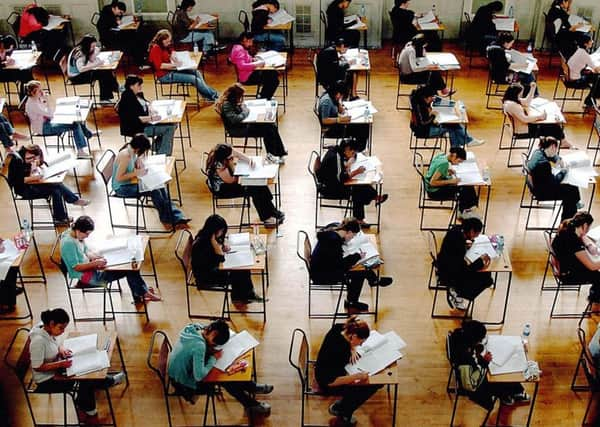NI pupils will lose out from changes to GCSE gradings


As the new grade 5 is set higher than the existing grade C, there is the danger that pupils in Northern Ireland with a Grade C will no longer be perceived as having a “good GCSE”, and over 40,000 examination entries in Northern Ireland each year are with English Awarding Bodies. This decision has deep implications for our pupils also in the national labour market.
There will also be a monopoly handed to CCEA, which will not be regulated as the English Examination Boards are; as well there will be less choice of subjects for our pupils. The big advantage for the Minister is that the decision on GCSEs will probably render impossible the yearly comparisons of our pupils’ performance with and England and Wales. There are clear contradictions in all of this about opportunity and freedom of choice, and our pupils will lose out.
Advertisement
Hide AdAdvertisement
Hide AdThis decision, which ignores the views of a large number of Principals and flies in the face of the desire to give freedom of choice, is the latest of many concerns arising out of inconsistencies and contradictions inherent in current education policy.
Northern Ireland’s differentiated system of education at secondary level has, over the years, provided great choice in education for our children through the mix of grammar schools, secondary schools, integrated schools and comprehensive schools, and has consistently outperformed England and Wales in the public examinations; in addition our primary schools have been shown to be at a world class level.
All of this is due to hard-working teachers and school leaders who have delivered, in their varying situations, a consistency and a constancy of performance, which children need and which encourage trust and self-confidence. Indeed, in addition, many schools through their teaching and wide range of extracurricular activities are delivering a service equal to that of the public schools in the rest of the United Kingdom where parents are paying thousands of pounds for the privilege.
All of this stands in stark contrast to what is being experienced today. Other examples of inconsistencies and contradictions include.
Advertisement
Hide AdAdvertisement
Hide Ad1.In area planning there is stress on “big is best” and on applying the Bain Report’s conclusion that secondary schools should have to be of a certain minimum size; yet experience in England shows that increases in school numbers affect performance adversely. It is also most important to our rural communities that leeway is given in terms of numbers. A relevant point here is a situation in one area where a school of around 200 pupils which served its community and was important to it, was closed and another school of around 20 pupils was moved onto that same site. Where is the consistency here or are other agenda at work?
2.There is much stress, quite rightly, on best practice, yet we see money wasted, among other things on the deeply flawed PISA reports; clear evidence from Project Follow Through, from the study of the effects of the Enriched Curriculum in the Greater Shankill area and from the Wolf Report shows the advantages to be gained from traditional teaching and from traditional subjects. Traditional teaching has been shown to address the needs of children in disadvantaged areas and does not, in itself, preclude exciting presentations or projects or skills for the modern age.
3.All educational systems in the world will have tails of underachievement and there is much talk of the need to address the needs here of children in disadvantaged areas, but what has been done about this in the last 7 years? There is need for immediate action, investment of money to the classroom and innovative thinking to address this; the so- called progressive agenda does not work, for progression means regression; mere words are insufficient. There is a deep contradiction between the talk and the action.
4.Finally our schools over the past few years have been at the receiving end of deep cuts to their budgets. We have a situation here where our schools receive much smaller amounts of the money dedicated for use at the front line, something like 58 or 59% compared with around 80% in England; indeed among certain schools there, the percentage is much greater than 80. Why is there this difference? There is evidence of money being wasted over the years in studies and surveys, and we wait to hear what has been saved through the creation of ESA. Money is certainly tight at the moment but there are peripheral areas where much could be saved and given to schools directly.
Advertisement
Hide AdAdvertisement
Hide AdI have deep concerns about contradictions between what the vision apparently is and what is happening on the ground. If these inconsistencies and contradictions are due to human error or misunderstanding, it is very worrying, but if they are due to other agendas, then it is very serious.
In the run-up to the local elections, it seems to me to be imperative that our MLAs look at what is happening in education and ask questions in the Assembly about it in a sustained way, that Principals who have these and similar concerns, fearlessly continue to keep the pressure on the Department of Education, and that members of the public, who wish to see our education system continue to flourish and to improve, examine closely the views and proposals of the various political parties.
There is now a great opportunity to make a real difference, particularly to the lives of some children, but in decision-making, attention has to be paid to the views of those who teach or have taught; too many decisions are taken by those who have no experience of education, often based on proposals and views of ones who have never taught.
• Billy Young is a former headmaster of Belfast Royal Academy